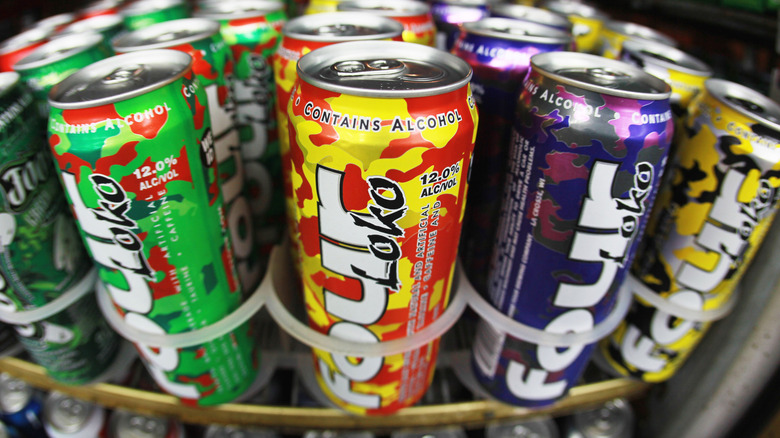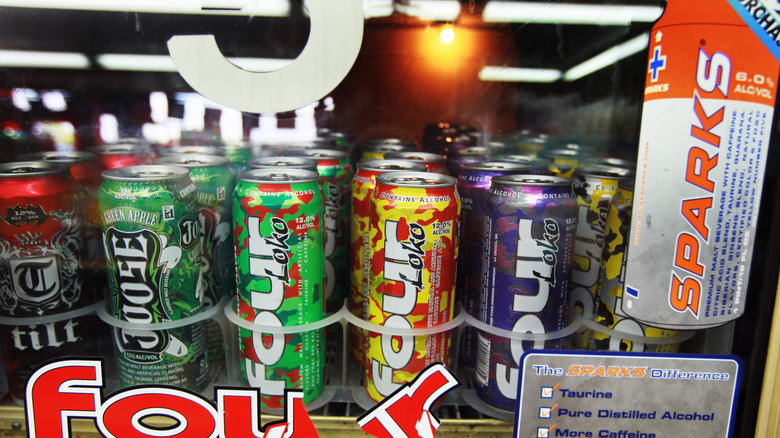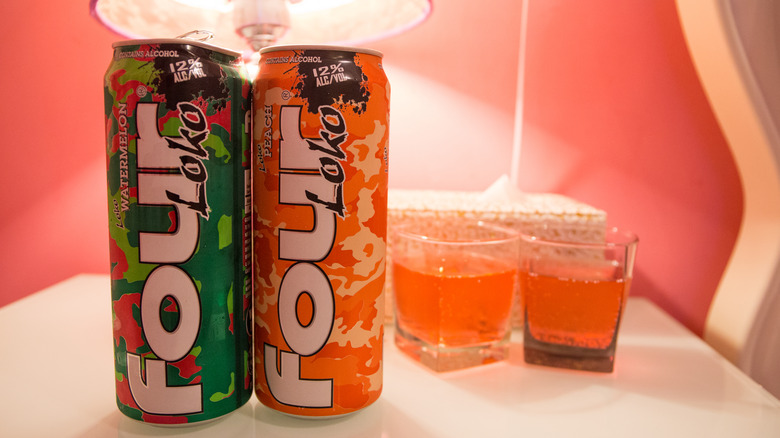The Original Caffeine-Infused Four Loko That Was Thankfully Discontinued
When your product earns the nickname "liquid crack," you know you've either done something very right or very wrong. In the case of Four Loko, it was both. The boozy beverage in the camo can gave rise to a multimillion-dollar business while becoming one of the most infamous products of the 21st century thus far. At 12% ABV in a 23.5-ounce can, a single Four Loko packs as much inebriating power as four to six beers. That is so much alcohol that, in 2011, the FTC released a statement saying that "Consuming a single can of Four Loko on a single occasion constitutes 'binge drinking.'" But believe it or not, the Four Loko on the market today is actually tame compared to the original version, which incorporated more psychoactive compounds, most notably caffeine.
Caffeine plus alcohol is a concerning equation, one being an upper and the other a downer. Experts, including the FDA and the CDC, have cautioned against combining the two because caffeine's stimulating powers can mask the effects of alcohol, making people unaware of how drunk they really are and leading them to drink far more than is safe. Nevertheless, there are a number of drinks that marry both elements, including the espresso martini, rum and coke, Irish coffee, and Jägerbombs. However, none of these are quite as potent as the original Four Loko, a drink that was blamed for multiple deaths, banned in five states, and spawned its own musical subgenre in the process.
The Loko legend
If an alcoholic energy drink sounds like some frat boy's fever dream, that's actually pretty spot on. Four Loko was invented by Jeff Wright, Jaisen Freeman, and Christopher Hunter, all three of whom were alumni of the Kappa Sigma fraternity at The Ohio State University. In 2005, the trio started a beverage brand called Phusion Projects, inspired by another drink called Sparks, comically referred to by some as "energy beer," which was ultimately discontinued in the mid-2000s for the same controversial reasons that later led Four Loko to change its formula. Phusion's debut product was simply called "Four," after the four main ingredients it contained: caffeine, taurine, guarana, and wormwood. It also clocked in at 6% ABV.
Four turned out to be a massive flop, but Wright, Freeman, and Hunter weren't going to give up. They went back to the drawing board and reformulated their product, cutting out the wormwood and doubling the alcohol content. They also adopted the iconic camo can and a revamped moniker: Four Loko. The product relaunched in 2008, and unlike its predecessor, Loko was an instant hit. Between 2009 and 2010, Phusion tripled its earnings, selling roughly 60 million cans of Four Loko for a profit of about $150 million. The drink's branding earned it a special place in pop culture: the summer of 2010 saw a number of underground rappers post Four Loko-centric songs on YouTube. But this meteoric rise to stardom came with quite a bit of controversy.
Four Loko faced government backlash
Caffeinated Four Loko only existed for two years, but in that brief span, it gained an incomparable reputation of pure lunacy. Tales of Four Loko-induced chaos began popping up all over the internet, even giving rise to a website called FourLokoStories.com where users recounted all the crazy things they did while Loked out of their minds. Most of these reports included long gaps in the consumer's memory, earning Four Loko the ominous nickname "blackout in a can." Notable tales of terror include that of a man who broke into a home and defecated on the carpet, another who unwittingly stole his friend's video games, and most disturbingly, a father of seven who threatened his family's lives before passing out.
Politicians deemed Four Loko a menace to public safety. New York Assemblyman Felix Ortiz proposed a ban on the drink, and decided to back up his case by drinking two Four Lokos in under an hour to illustrate their risks. After a spike in blood pressure and extensive vomiting, he had to be revived with pizza. New York ultimately did ban Four Loko, as did Washington, Utah, Oklahoma, and Michigan. In November 2010, the FDA sent a letter to Phusion Projects and other makers of alcoholic energy drinks threatening a federal ban on their products. Later that month, Phusion announced that it would remove caffeine, taurine, and guarana from Four Loko, leaving us with the slightly safer formula that we know today.


